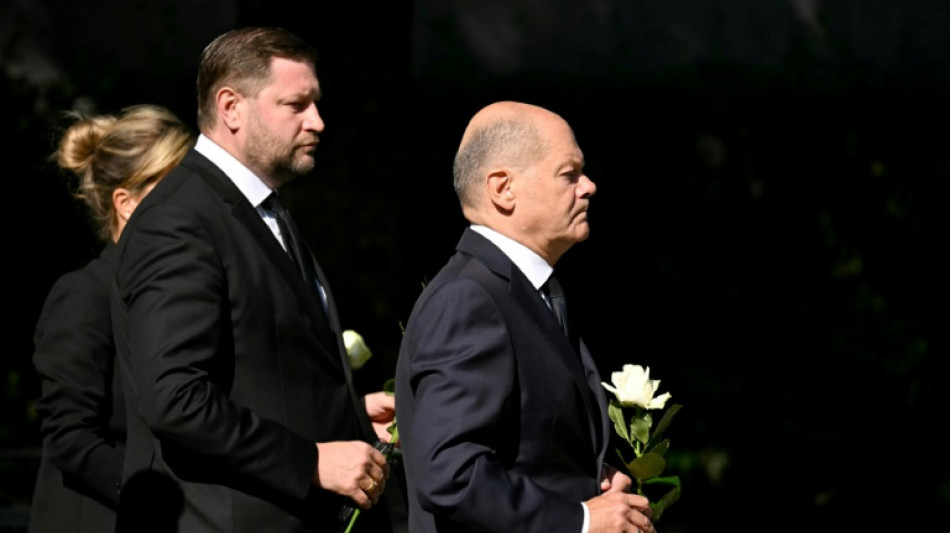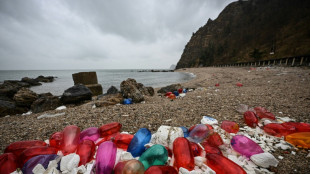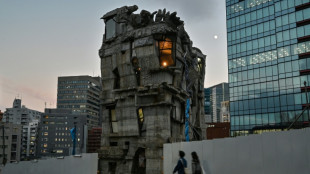

Scholz says deadly knife attack was 'against us all'
German Chancellor Olaf Scholz on Monday called last week's deadly knife attack an act "terrorism against us all" and pledged swift action to tighten weapons controls.
The violence Friday at a street festival in western Germany's Solingen, which killed three people and wounded eight, was allegedly carried out by a 26-year-old Syrian man with links to the Islamic State (IS) group.
The events have shaken Germany and fuelled a renewed debate about immigration ahead of key regional elections set for Sunday.
"This was terrorism, terrorism against us all," Scholz said at a press conference in Solingen.
The attack threatened "the way we live together", the chancellor said.
Flanked by regional political leaders, Scholz laid flowers at a makeshift memorial to the victims and spoke with emergency service responders.
"We will now have to tighten up the weapons regulations... in particular with regard to the use of knives," Scholz said, adding that "I'm sure this will happen very quickly".
Germany would also have to "do everything we can to ensure that those who cannot and must not stay here in Germany are repatriated and deported," Scholz said.
- Islamic State link -
The suspect in the attack, a 26-year-old Syrian man, gave himself up to authorities late Saturday after a day on the run and confessed, police said.
German anti-terrorism prosecutors have taken over the investigation and the man, named as Issa Al H., has been detained on suspicion of murder, attempted murder and belonging to a "terrorist group".
The Islamic State group said in a statement on Saturday that one of its members had carried out the attack in "revenge" for Muslims "in Palestine and everywhere".
"The perpetrator of the attack on a gathering of Christians in the city of Solingen in Germany yesterday was a soldier of the Islamic State," said a statement from the jihadists' Amaq news agency on the Telegram messaging app.
The claim could not be immediately verified.
According to the Bild and Spiegel news outlets, the suspect arrived in Germany in December 2022 and had a protected immigration status often given to those fleeing war-torn Syria.
He was meant to have been deported to Bulgaria, where he had first arrived in the European Union, but the operation failed after he went missing.
The suspect was not however known to German security services as a dangerous extremist, according to officials.
- Immigration debate -
The attack has reignited a debate around immigration in the EU's most populous country ahead of regional elections next weekend in Saxony and Thuringia, two states in the former communist East Germany.
The far-right, anti-immigrant AfD party, which is aiming for gains in the state polls after recent electoral wins, has accused successive governments of having caused "chaos" by allowing in too many immigrants.
The co-leader of the AfD, Alice Weidel, on Monday called for a "stop to immigration, admission and naturalisation" for five years.
Meanwhile, Friedrich Merz, the head of the conservative CDU, Germany's main opposition party, urged the government to stop taking in refugees from Syria and Afghanistan.
A complete stop to asylum applications from those countries would not be in keeping with Germany's constitution, Scholz's spokesman Steffen Hebestreit said at a regular government press conference on Monday.
On the other side of the equation, Scholz's government was already under pressure to resume deportations to both countries, after a halt of several years.
Members of Scholz's ruling coalition had called for tougher deportation measures after a 25-year-old Afghan stabbed a policeman to death in Mannheim in May, in an attack that targeted an anti-Islam rally.
German security services have been on high alert for Islamist attacks since the Gaza war erupted on October 7 with the Hamas attacks on Israel.
Germany has been hit by several such attacks in recent years, with the most deadly being a truck rampage at a Berlin Christmas market in 2016 that killed 12 people.
袁-J.Pān--THT-士蔑報




